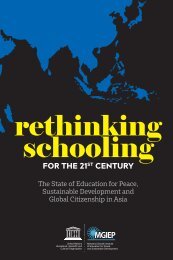The Blue DOT Issue 13
Reimagining Education: Beyond the Rhetoric
Reimagining Education: Beyond the Rhetoric
You also want an ePaper? Increase the reach of your titles
YUMPU automatically turns print PDFs into web optimized ePapers that Google loves.
Reimagining education:<br />
OPINION<br />
Perspectives From Africa<br />
on the <strong>Issue</strong> of Access<br />
PATRICK MAKOKORO<br />
Patrick Makokoro is an educational<br />
researcher and development<br />
practitioner with extensive<br />
experience working in community<br />
and international development. He is<br />
a dedicated child rights activist and<br />
passionate about social justice issues<br />
around the world. Among other<br />
social entrepreneurship initiatives,<br />
he founded the Nhaka Foundation, a<br />
charitable organization that provides<br />
education, meals, health care,<br />
psycho-social support, and other<br />
essential services to orphaned and<br />
vulnerable children in Africa. He is<br />
currently a Doctoral Candidate in the<br />
Faculty of Education at the University<br />
of Victoria, Canada.<br />
<strong>The</strong> impact of COVID-19 in Africa<br />
has been devastating and the real<br />
costs are still to be fully quantified.<br />
<strong>The</strong> pandemic revealed inadequacies<br />
and inequalities in social and economic<br />
institutions, including access to education.<br />
What we have learned has brought into<br />
clear focus the need for evaluation and<br />
transformation.<br />
At a macro-level, a number of factors have<br />
determined how governments address the<br />
educational needs of children and their<br />
families during this crisis. Countries in the<br />
Global North have provided relief support<br />
to the citizens and businesses through<br />
stimulus packages. In these economies,<br />
taxes have been waived or deferred and<br />
this has brought much-needed relief to<br />
individuals and businesses.<br />
In Africa, the governments have<br />
worked together through the<br />
continental political bloc, the<br />
African Union, to provide a strategic<br />
response, but implementation and<br />
coordination have been seriously<br />
restricted due to lack of funding.<br />
<strong>The</strong>refore, the African Union launched<br />
In Africa, the governments<br />
have worked together<br />
through the continental<br />
political bloc, the African<br />
Union, to provide a<br />
strategic response, but<br />
implementation and<br />
coordination have been<br />
seriously restricted due to<br />
lack of funding.<br />
a fundraising campaign in order to raise funds that would be<br />
distributed to African countries through the African Center for<br />
Disease Control and Prevention (Africa CDC). <strong>The</strong> funds raised<br />
were to be directed towards mitigating the economic, humanitarian,<br />
and social impact of COVID-19 in African countries; these efforts<br />
included enhancing the capacity of the Africa CDC to respond<br />
to public health emergencies due to COVID-19 and for the<br />
distribution of personal protection equipment (PPE) and other<br />
essential supplies.<br />
At a country level, endemic corruption in the distribution of PPE<br />
and food supplies, as well as poor leadership, exposed communities<br />
to the deadly reality of the pandemic. In health institutions, fear<br />
of contracting the virus because of insufficient PPE led to reduced<br />
service. This hampered the roll out of national-level public health<br />
responses. With policy measures to restrict COVID-19 infections<br />
in play, it also meant that other regularly deployed community<br />
health measures to contain spread of diseases were affected.<br />
Routine immunizations and child health monitoring assessments<br />
were stopped in most communities, increasing the risks for<br />
already challenged families. Quality of life for the most vulnerable<br />
segments in society, especially women and children, was gravely<br />
compromised.<br />
Globally, schools were shut down as part of the COVID-19<br />
lockdown measures governments introduced to protect their<br />
citizenry. In many African countries, schools being closed also<br />
meant that children’s access to adequate nutrition through school<br />
ISSUE • <strong>13</strong><br />
2 9

















